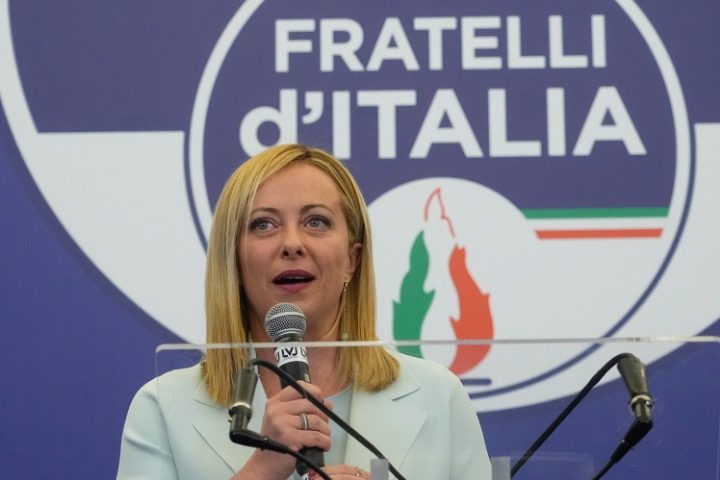
Italian local daily Il Giornale reported on August 31 that Prime Minister Giorgia Meloni would enforce the Cutro decree, with new rules to decrease the flow of illegal immigration, enable migrant returns, and prevent Italy from being the busiest port for migrants from all around the globe.
“I decided to fully implement the Cutro decree on returns. We will bring new rules but I think more coordination is needed in the government, both nationally and internationally,” Meloni stated.
The Cutro decree, which got its name from the maritime disaster that claimed 89 refugee lives in February, was initially mooted by the Italian government in March, but both chambers of Parliament adopted it in the following months.
The package entails new legislation that drastically raises the punishment for human trafficking (up to three decades in prison), and removes many legal incentives that motivate migrants to rely on illegal channels. Some of these incentives include special asylum rights to people who would not be eligible for them under EU law. Those who cannot provide evidence for their right to remain in Italy would have to leave.
However, despite full enforcement, results of the decree will take time to bear fruit, Meloni cautioned, requesting the patience of Italians. “It’s a huge, long job that will eventually pay off. But in the meantime, we are under tremendous pressure, and I understand that the Italians are demanding immediate answers.”
The decree also encompasses key diplomatic initiatives, and Meloni assures that her government is in continuous talks with certain European partners as well as origin and transit countries to expedite migrant deportations.
She also reiterated that “further regulatory measures to combat illegal migration and human trafficking” are in the process of being crafted, apart from those laid out in the Cutro decree, to keep any legal loopholes from being abused.
Italy’s government has every reason to adopt a tough stance against illegal migration. After all, Meloni’s unflinching position on Europe’s migration crisis was arguably the largest factor propelling her to electoral victory in 2022. Nonetheless, over the past year, Italians have had to face huge waves of migrants streaming into the country, with illegal arrivals into the country exceeding 100,000 in early August this year.
Additionally, the southern Italian island of Lampedusa had to ask for government intervention after the island’s refugee center could not handle the historic influx of migrants, with Il Giornale reporting on August 27 that over 2,000 arrivals were registered over a weekend.
Since the early 2000s, Lampedusa has been the main landing destination for refugees crossing the Mediterranean to Europe. Although its reception center was built to house a maximum of 800 refugees, it has housed three times that number, despite the six other refugee camps in nearby Sicily and Puglia already being filled up.
With asylum centers overloaded, as well as staff and resources exhausted, it is no wonder that Italian voters are questioning their decision to elect Meloni and her Fratelli d’Italia, believing the government has not effectively stemmed illegal migration.
In light of the current situation, Meloni highlighted that Rome is not the sole party responsible to address the migrant crisis.
“The change of pace is because today the EU discusses first how to fight illegal immigration on Mediterranean routes and then how to distribute migrants. In past years only the latter part was discussed,” she posited. She called for other parliamentary factions in the Italian government to participate in combating illegal migration. “The problem goes beyond political color,” she said.
“Migration flows out of the ordinary,” said Matteo Salvini, deputy PM and head of the second-largest conservative group, Lega. He voiced his support for Meloni’s plan, declaring that “a new security decree is needed as early as September because Italy cannot be the arrival point for migrants from halfway around the world.”
Meanwhile, in nearby Belgium, hundreds of male asylum seekers were left to fend for themselves on Brussels’ streets after the Belgian government banned single men from entering refugee shelters within the network of Fedasil, the agency responsible for the reception of asylum seekers in Belgium, notwithstanding various courts ruling against the move.
The Brussels Times reported that the ban was regarded as a dangerous decision to human health and public safely, with politicians stating that the number of homeless refugees could snowball.
Nicole de Moor, the state secretary for asylum and migration, justified Brussels’ decision owing to the massive influx of refugees overstretching the Belgian asylum system. She also pointed out that the government had previously limited single men’s access to migrant shelters in October 2021, prioritizing women, minors, and families instead.
However, critics of Brussels’ recent decision continue to contend that such a move was unlawful as Brussels, Belgian, and even European courts had overruled the decision various times. The Belgian federal government has refused to pay the penal fines due to its dismissals of the aforementioned court rulings. Consequently, NGOs have been alluding to the government’s decision as the “death of the rule of law,” the Times reported.
“This latest decision is just totally illegal, on a national, international, and EU level. The problem is that, at this point, we are completely beyond legality in Belgium,” lambasted Marie Doutrepont, a lawyer at Progressive Lawyers Network. “We now have a minister announcing through the media that she will not respect the law for an undefined period of time. This is completely unseen.”
Observers have also argued that the government’s latest measure would not be effective, as Fedasil is rapidly running out of room for migrant families as well. What is more, observers have asserted that the government ban would not stop single migrant men from heading to Belgium. Naysayers of the ban allege that migrants will continue to exacerbate Brussels’ prevalent homelessness problem and worsen the city’s crime and drug issues.
“This will have deleterious effects in Brussels in any case, and not just around the Midi Station. The Federal Government must assume its national and international responsibilities and obligations,” Brussels Environment Minister Alain Maron contended.
Employment Minister Bernard Clerfayt echoed Maron’s statements, saying that the government “is leaving thousands of migrants to wander the streets and railway stations of Brussels.”
Nevertheless, the Belgian government has maintained that the prohibition of men in asylum shelters was the sole solution to the migrant crisis. The government also blasted the EU for the quagmire, stating that nothing could be done until the finalization of the contentious Migration Pact discussed by the various home affairs ministers for the EU states in June this year.
The failure of Belgium’s asylum system has been notably evidenced by the fact that the neighboring Netherlands stopped dispatching illegal migrants back to Belgium, as Dutch laws prevent migrant returns to EU countries “where there is no humane reception.”



